Cuando intentamos iniciar sesión en nuestros propios sitios web de WordPress, a veces la página de inicio de sesión se actualiza y redirige constantemente, lo que nos impide acceder al área de administración de WordPress.
Si está experimentando esto, no está solo. El problema de actualización y redirección de la página de inicio de sesión de WordPress es común y frustra a muchos propietarios de sitios WordPress. Dicho esto, hemos probado varios métodos para resolver el problema.
En esta completa guía, le mostraremos cómo solucionar el problema de actualización y redirección de la página de inicio de sesión de WordPress. Sumerjámonos de lleno y volvamos a su escritorio de WordPress para que pueda recuperar el control de su sitio web.
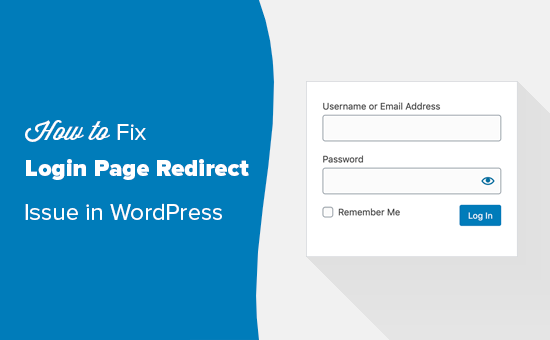
¿Cuál es la causa del problema de actualización y redirección de la página de acceso en WordPress?
El error de actualización y redirección de la página de inicio de sesión de WordPress (también llamado bucle de redirección de inicio de sesión de WordPress) suele estar causado por una configuración incorrecta de la URL de WordPress o por un fallo en la configuración de las cookies de inicio de sesión.
Normalmente, cuando accedes, WordPress valida tu nombre de usuario y contraseña y luego establece una cookie de acceso en tu navegador / explorador. Después, te redirige al escritorio de WordPress.
Si WordPress no establece la cookie de acceso correctamente o la URL de su área de administración de WordPress es incorrecta, será redirigido de nuevo a la pantalla de acceso en lugar de al escritorio de administrador.
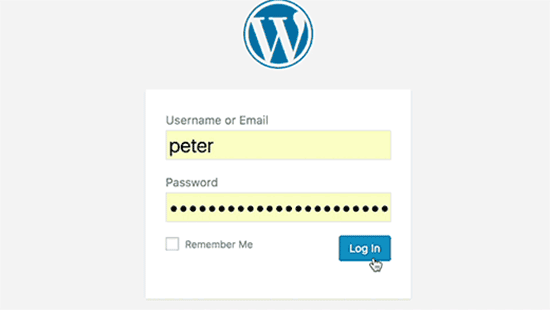
Los problemas de acceso / acceso también pueden ser causados por diferentes errores de WordPress, como el error al establecer la conexión con la base de datos, error interno del servidor, o la pantalla blanca de la muerte.
Con esto en mente, vamos a diagnosticar y corregir el problema de redirección y actualización de la página de acceso de WordPress. Puede utilizar estos enlaces rápidos para saltar a un método específico:
- Method 1: Clear Cookies to Resolve Login Issues
- Method 2: Update WordPress URL Settings
- Method 3: Delete .htaccess File in WordPress
- Method 4: Deactivate Your Plugins
- Method 5: Revert Back to the Default Theme
- Method 6: Reinstall WordPress Core
- Video Tutorial
- What to Do If You Can't Fix WordPress Login Redirect Issue
Nota: Si desea probar los pasos avanzados de este tutorial de WordPress, cree primero una copia de seguridad de su sitio. Consulte nuestra guía sobre cómo crear manualmente una copia de seguridad de la base de datos de WordPress.
Método 1: Vaciar cookies para resolver problemas de acceso / incidencia
WordPress utiliza cookies para la identificación de acceso, por lo que el primer paso para diagnosticar problemas de acceso a WordPress es el más sencillo. Deberá vaciar las cookies y la memoria caché de su navegador / explorador.
En Google Chrome, basta con hacer clic en el menú de ajustes del navegador y seleccionar Más herramientas ” Vaciar datos de navegación.
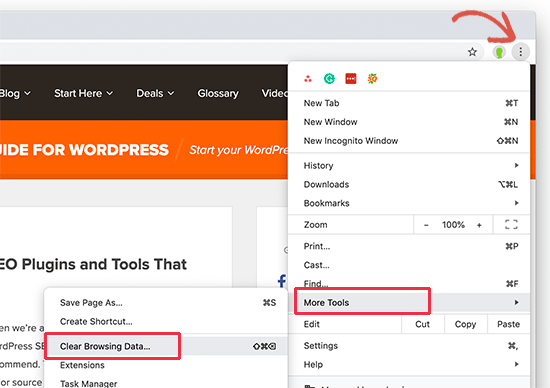
Se abrirá la página de ajustes de Chrome con un mensaje / ventana emergente “Vaciar datos de navegación” en la pantalla.
Desde aquí, debe seleccionar las opciones “Vaciar cookies y otros datos del sitio” e “Imágenes y archivos almacenados en caché”.
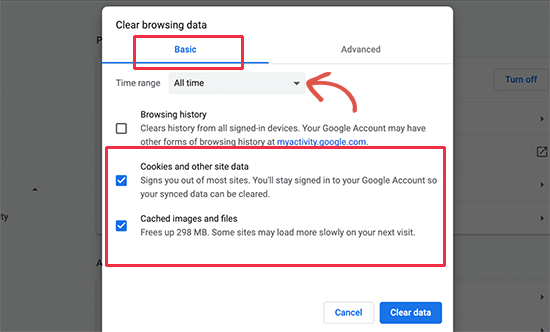
A continuación, haz clic en el botón “Borrar datos” y Google Chrome vaciará la caché del navegador.
Asegúrese también de que su navegador tiene activadas las cookies. Una vez hecho esto, reinicia el navegador e intenta acceder. Esto debería corregir el problema para la mayoría de la gente.
Tenemos una guía completa con capturas de pantalla que muestran cómo vaciar la caché y las cookies en los principales navegadores.
Método 2: Actualizar los ajustes de URL de WordPress
WordPress viene con ajustes para la URL de su sitio web y la URL de su instalación de WordPress.
Si tiene acceso al área de administrador de WordPress, podrá ver esta opción en la página Ajustes ” General.
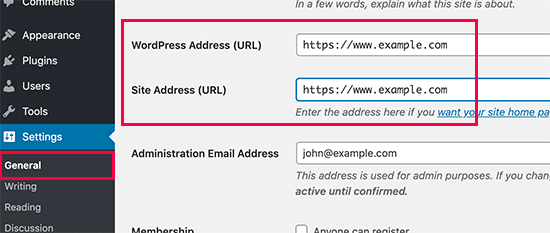
Si estas URLs son incorrectas, WordPress le redirigirá de nuevo a la página de acceso.
Dado que no se ha podido acceder al área de administrador de WordPress, deberá editar el archivo wp-config. php para corregir este problema.
El archivo wp-config.php es un archivo especial de WordPress que contiene los ajustes importantes de WordPress. Puede acceder a él mediante un cliente FTP o a través de la aplicación Administrador de archivos en el escritorio de WordPress de su cuenta de alojamiento.
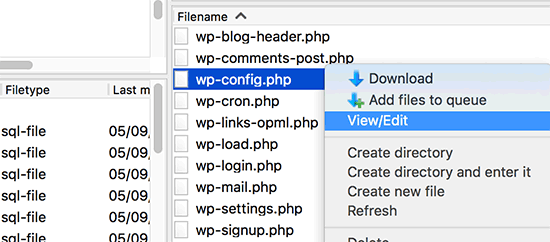
Encontrarás el archivo wp-config.php en la carpeta raíz de tu sitio. Simplemente edite el archivo y pegue las siguientes líneas de código justo antes de la que dice: ‘ ¡Eso es todo, deje de editar! Feliz publicación'.
1 2 | define('WP_HOME','https://www.example.com');define('WP_SITEURL','https://www.example.com'); |
No olvide sustituir “ejemplo.com” por su propio nombre de dominio.
Después, guarda los cambios y vuelve a subir el archivo a tu sitio web.
Ahora puede visitar su sitio web de WordPress e intentar acceder. Esperamos que esto haya corregido el problema. Si no es así, sigue leyendo para diagnosticar otros problemas.
Método 3: Borrar archivo .htaccess en WordPress
A veces, el archivo .htaccess puede corromperse, lo que puede provocar errores internos del servidor o el error de actualización de la página de acceso.
Sólo tienes que acceder a tu sitio web mediante un cliente FTP o a través de la aplicación de gestión de archivos del panel de control de tu proveedor de alojamiento.
Una vez conectado, localice el archivo .htaccess en el directorio raíz de su sitio web y descárguelo a su ordenador como copia de seguridad.
Si no puede encontrar su archivo .htaccess, esta guía sobre por qué puede faltar su archivo .htaccess puede ayudarle.
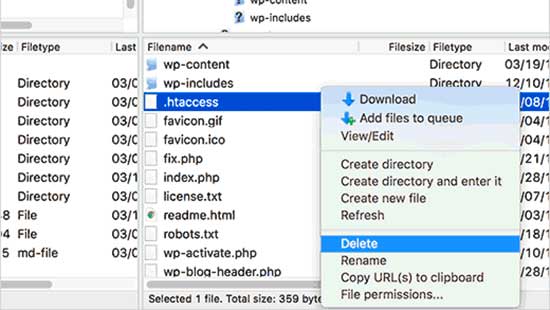
A continuación, borre el archivo .htaccess de su sitio web.
A continuación, abra el directorio wp-admin, y si hay un archivo .htaccess allí, entonces seguir adelante y borrarlo también.
Ahora puede intentar acceder a su sitio web de WordPress. Si lo consigue, significa que su archivo .htaccess le impedía acceder a WordPress.
Una vez que haya accedido, simplemente vaya a la página Ajustes ” Enlaces permanentes en el panel de administrador de WordPress y haga clic en el botón “Guardar” sin realizar ningún cambio. Esto generará un nuevo archivo .htaccess para tu sitio web.
Método 4: Desactive sus plugins
A veces, los plugins de WordPress pueden causar este problema, especialmente si hay un conflicto entre dos plugins.
Para desactivar fácilmente todos sus plugins de WordPress, conéctese a su sitio web mediante un cliente FTP o a través de la aplicación Administrador de archivos del panel de control de su cuenta de alojamiento web.
Una vez conectado, vaya al directorio /wp-content/. Dentro de él, verá una carpeta llamada ‘plugins’. Aquí es donde WordPress instala todos tus plugins.
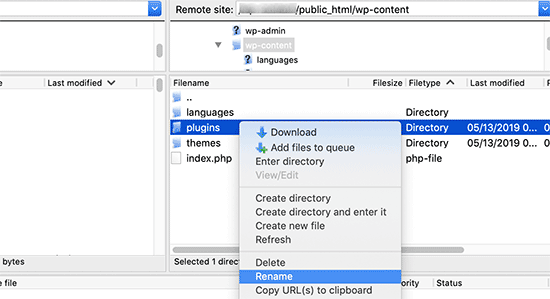
Simplemente renombra la carpeta de plugins a ‘plugins_backup’. Esto desactivará todos los plugins de WordPress instalados en su sitio web.
También tenemos un tutorial detallado sobre cómo desactivar todos los plugins de WordPress cuando el administrador de WordPress es inaccesible.
Una vez que haya desactivado todos los plugins, intente acceder a su sitio de WordPress. Si lo consigues, significa que uno de tus plugins era el causante del problema / conflicto / incidencia.
Método 5: Volver al tema predeterminado
Los temas de WordPress también pueden causar conflictos tras la actualización a una versión más reciente de WordPress o del propio tema. Para averiguar si el problema lo está causando tu tema, tendrás que desactivarlo.
El proceso es similar a la desactivación de plugins. Conéctese a su sitio web utilizando un cliente FTP. Luego, debes ir al directorio /wp-content/themes/ y renombrar el directorio de tu tema actual a ‘themes_backup’.
Una vez hecho esto, intente acceder de nuevo. Si lo consigue, significa que el tema era el causante del problema / conflicto / incidencia.
Ahora puedes reinstalar una copia nueva de tu tema para ver si se resuelve el problema / conflicto / incidencia. Si el problema reaparece, tendrás que ponerte en contacto con el soporte de tu tema o cambiar a otro tema de WordPress.
Método 6: Reinstalar el núcleo de WordPress
En raras ocasiones, el problema de actualización persistente de la página de acceso / acceso puede deberse a que los archivos del núcleo de WordPress estén dañados.
Estos archivos del núcleo son la base de su sitio web WordPress y gestionan funcionalidades esenciales. Si estos archivos se dañan o se sobrescriben con un código incorrecto, pueden producirse varios errores, incluidos problemas de acceso / acceso.
En primer lugar, dirígete a WordPress.org y descarga la última versión del software. Una vez descargada, descomprime el archivo en tu ordenador. Se creará una carpeta llamada “wordpress” que contendrá todos los archivos necesarios para la reinstalación.
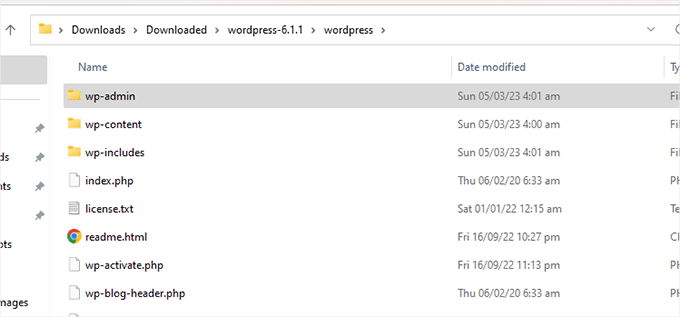
A continuación, tendrá que conectarse a su sitio web mediante un cliente FTP o el gestor de archivos que le proporcione su empresa de alojamiento.
Una vez conectado, vaya a la carpeta raíz de su sitio web. Este es el directorio principal que contiene carpetas como wp-admin, wp-content y wp-includes.
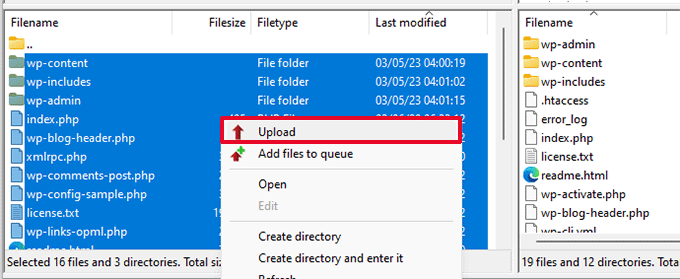
En esta fase, coge todos los archivos de la carpeta “wordpress” de tu ordenador y súbelos al directorio raíz de tu sitio web.
Su cliente FTP le pedirá que confirme la sobrescritura de cualquier archivo de núcleo existente.
Dado que está borrando archivos dañados del núcleo de WordPress y sustituyéndolos por otros nuevos, elija “Sobrescribir” y seleccione la opción “Usar siempre esta acción” para evitar tener que confirmar cada archivo individualmente.
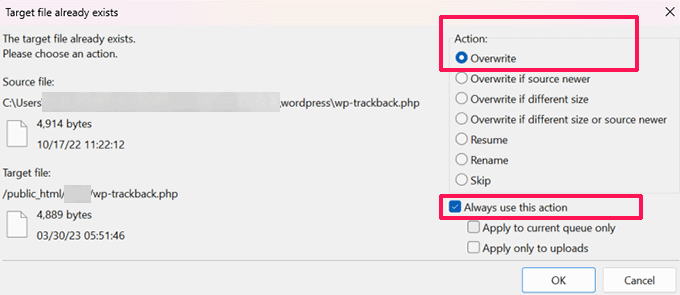
Por último, haga clic en “Aceptar” para iniciar el proceso de subida. Su cliente FTP sustituirá los archivos del núcleo de WordPress de su sitio web por los nuevos archivos de su ordenador.
Una vez completada la subida, visita tu sitio web para ver si se ha corregido el error. Si el problema / conflicto / acceso se debe a un archivo de núcleo dañado o a malware, el mensaje de error debería desaparecer y debería poder acceder correctamente.
Tutorial en vídeo
Si necesita instrucciones visuales, vea el siguiente vídeo.
Qué hacer si no puede solucionar el problema de redirección de inicio de sesión de WordPress
Si lo has intentado todo, desde borrar las cookies del navegador hasta desactivar temas y plugins, pero el problema persiste, puedes solicitar ayuda en la comunidad de WordPress.
Los usuarios de grupos como el WPBeginner Engage Facebook group pueden haber experimentado el mismo problema que usted y pueden proporcionar consejos sobre qué hacer para resolver los problemas de la página de inicio de sesión.
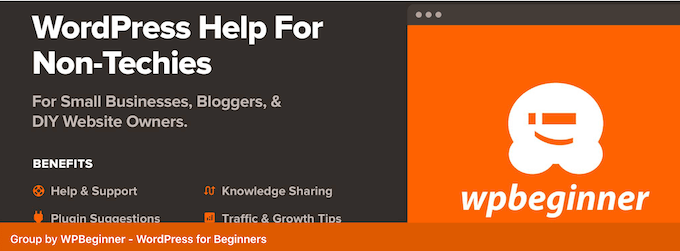
Aparte de eso, puede recurrir a soluciones de soporte de WordPress como WPBeginner Pro Services. Ofrecemos soporte premium de emergencia para WordPress, donde los expertos pueden identificar lo que está sucediendo con su sitio web y abordar la causa raíz del problema.
También puede contratar nuestros servicios de mantenimiento de WordPress para evitar que problemas como el malware, el elevado tiempo de inactividad y la desactualización de WordPress afecten a su sitio web en primer lugar.
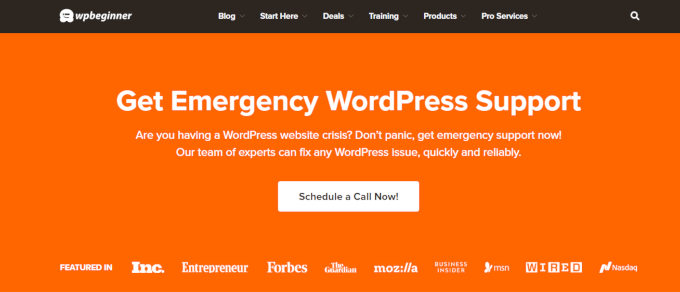
No dude en concertar una cita con nuestro equipo hoy mismo para ver qué podemos hacer para arreglar su sitio web.
Más información Soluciones para diagnosticar problemas de WordPress
¿Está experimentando otros errores comunes de WordPress y necesita encontrar una manera de corregirlos? Aquí tienes otros artículos que puedes marcar / comprobar:
- Cómo corregir el problema de demasiadas redirecciones en WordPress
- Cómo corregir fácilmente el error This Site Can’t Be Reached en WordPress
- Cómo corregir el mensaje “El sitio está experimentando dificultades técnicas” en WordPress
- Cómo corregir entradas de WordPress que devuelven el error 404 (paso a paso)
- Cómo corregir el error de contenido mixto en WordPress (paso a paso)
- Cómo corregir el error JSON no válido en WordPress (Guía para principiantes)
- Cómo encontrar y acceder a los registros de errores de WordPress (paso a paso)
- Cómo corregir el problema de que WordPress no envía correos electrónicos
- Cómo corregir el bloqueo de WordPress en modo de mantenimiento (de forma sencilla)
Esperamos que este artículo te haya ayudado a resolver el problema de actualización y redirección de la página de inicio de sesión de WordPress. También puedes consultar nuestra guía completa de solución de problemas de WordPress o echar un vistazo a nuestra selección de los mejores plugins y herramientas de WordPress para hacer crecer tu sitio.
If you liked this article, then please subscribe to our YouTube Channel for WordPress video tutorials. You can also find us on Twitter and Facebook.





Amnon Jakony
Deleting htaccess file worked fine for me…
WPBeginner Support
Glad to hear it was able to help you!
Admin
Harry k
Thanks for this video and the post. I tried above all of your methods but none of them fixed the issue. read the comment and found a solution as below. Edit HTTPS to HTTP.
define(‘WP_HOME’,’https://example.com’);
define(‘WP_SITEURL’,’https://example.com’);
to
define(‘WP_HOME’,’http://example.com’);
define(‘WP_SITEURL’,’http://example.com’);
WPBeginner Support
The issue with this method would be that your site would start to show the not secure message as your site would not be using HTRTPS. This can be a temporary workaround but you would want to update your site to use HTTPS after you are able to log in.
Admin
Tobias
No luck none of them worked
WPBeginner Support
If none of the methods from this article are working for you, we would recommend reaching out to your hosting provider for them to check if there are any errors on their end.
Admin
Salah
Thanks a lot,
You saved my day,
I have changed the file wp-config.php as described in the tutorial and that worked for me.
My best regards.
WPBeginner Support
Glad to hear our guide was helpful!
Admin
Robert clancy
I messed around with the Update WordPress URL Settings
and that was a world of pain to correct as it took my whole site down. I had to correct it through changing the config settings using FTP.
WPBeginner Support
The settings are definitely powerful and can cause issues if you change them incorrectly. Glad you were able to fix the issue using FTP!
Admin
DK John
Your first method worked for me. Thank you for this magical guide
WPBeginner Support
Glad our guide was helpful!
Admin
David Kuteesa
Tried all and none worked. Here is what worked:
Went to wp-config.php and set define( ‘WP_DEBUG’, false); to define( ‘WP_DEBUG’, true );
Tried logging in again and got “usermeta table missing” error.
Thats when I realised I had a missing table. Got it from another installation and changed the table prefix to meet current db.
Worked immediately
WPBeginner Support
Thank you for sharing this, for most beginners we recommend reaching out to their hosting provider if our recommendations do not work as they can check for less beginner friendly errors.
Admin
Stian
Thank you – that tip about restoring the admin page by adding two lines of code in the config file seems to work nicely (still crossing fingers), but I have hope now, which I didn´t earlier.
WPBeginner Support
We hope it helps!
Admin
WPBeginner Support
Glad our guide could help and if you hadn’t set up SSL before changing to https that would definitely be the most likely cause.
Admin
branhampaul
Thank You, it worked.
I initially had the siteurl & wp address url changed to “https”, and this made me unable to log-in my dashboard. Maybe because I had not ssl at my host set-up.
Re-changing the “https” to “http” helped me log-in back.
Bryan Veloso
Everything didn’t work. But after downgrading my PHP from 7.4 to 7.2, I was able to login.
Kinda weird, now I’m using an older PHP version.
Did you encounter an issue similar to mine? I want to use the newer PHP version, but it doesn’t let me login in wp-admin.
WPBeginner Support
More than likely, you may have a plugin causing a conflict, you would want to start by following our troubleshooting guide below:
https://www.wpbeginner.com/beginners-guide/beginners-guide-to-troubleshooting-wordpress-errors-step-by-step/
Admin
Alisha
This issue has never happened to me before, but the 2nd / plugin option worked for me right away.
This website is a lifesaver! Thank you so much!
WPBeginner Support
Glad our guide was helpful
Admin
Øivind
Thank you! The wp-config.php-metod worked for me!
WPBeginner Support
Glad our recommendation was able to assist
Admin
Ruta
I tried some of these steps, but the problem turned out to be elsewhere: my site was setup as a ‘multisite’ but in wp-config file it said ‘subdomain_install’ as ‘false’, when I changed it to ‘true’, I could login to the site normally without redirects
WPBeginner Support
Glad you found the solution to the issue
Admin
Jerry
This was also my problem! I tried all the steps mentioned in the article, but after changing the ‘subdomain_install’ from false to true in the wp-config.php file it worked!!
Thanks!!
Joe
I have been trying to solve this for MONTHS… Thanks to your comment, I was able to fix it in about 10 seconds. Thank you so much for sharing!
This should be included in the tutorial.
Brayton Scott
Awesome, and simply tutorial. 1st suggestion fixed my site.
WPBeginner Support
Glad our recommendation could help
Admin
Fraser
I followed the instructions to deactivate all plugins and I now have access to wp-admin again! The instructions were easy to follow, and thanks so much for putting them out there.
WPBeginner Support
Glad our article was helpful
Admin
Sachin Baikar
Thanks for this great help. The plugin folder renaming worked for me. There was an issue with one of the plugins. Thanks once again
WPBeginner Support
Glad our recommendations were able to help
Admin
E
Thank you for this article. It is a complete lifesaver.
WPBeginner Support
Glad our guide was helpful
Admin
Philipp
I was looking for a solution for over 5 hours now – nothing worked. But deleting the htaccess file in the wp-admin directory helped!
I cant thank you enough.
Made my day.
WPBeginner Support
Glad our recommendation helped
Admin
María González
Thank you! You just saved my life (at least my job!) and a loooot of time (:
WPBeginner Support
Glad our guide was able to help
Admin
Suraj Handa
Hey but now its showing that cookies are disable in your browser please enable cookies. What can I do now?
WPBeginner Support
There are a few possible reasons for a starting point, you may want to clear your cookies and cache to be safe. For a starting point, you may want to take a look at our article below:
https://www.wpbeginner.com/beginners-guide/how-to-clear-your-cache-in-wordpress
Admin
charlie
just refresh the page, the wordpress app reacts like that because it suddenly sees no more cookies
ajay mali
you are always post great content that really helps a lot to everyone. thank you so much.
WPBeginner Support
You’re welcome
Admin
David Cuff
Very helpful. Thank you!
WPBeginner Support
You’re welcome
Admin
ibrahim zouadi
Thank you for sharing those tips, unfortunately none of them have worked for me. I even uninstalled the whole wordpress plugin. I don’t know what should i do next
WPBeginner Support
For the next step, you would want to take at our article below:
https://www.wpbeginner.com/beginners-guide/beginners-guide-to-troubleshooting-wordpress-errors-step-by-step/
Admin
Anthony
This helped like charm
Many thanks.
WPBeginner Support
You’re welcome
Admin
PDN Social
This was a lifesaver! We were able to follow step-by-step and avoid a major problem!
Great information!
WPBeginner Support
Glad our guide was helpful
Admin
Jasmeet Singh
I couldn’t find my wp admin page. It shows
“There has been a critical error on your website. Please check your site admin email inbox for instructions.
Learn more about debugging in WordPress.”
How can I fix this error?
WPBeginner Support
For that specific error, you would want to follow our guide below:
https://www.wpbeginner.com/wp-tutorials/how-to-fix-the-wordpress-white-screen-of-death
Admin
cristi
Hi, i have change by mistake my url and now the domain wp admin login url bring me to other site and i cont have ftp access how i can change back them?
WPBeginner Support
You can either reach out to your hosting provider or if you have phpMyAdmin access you could change the options table and update the URL and address.
Admin
Ankit
define(‘WP_HOME’,’https://www.example.com’);
define(‘WP_SITEURL’,’https://www.example.com’);
where do these two lines add in wp-config.php file?
At Last OR At Start?
Please clarify
WPBeginner Support
As we state in the article: paste the code just before the line that says ‘That’s all, stop editing! Happy publishing’.
Admin
Paek
Thank you so much!!!
Adding the wp-config lines solved it.
Thanks!
WPBeginner Support
You’re welcome
Admin
Ada
Thank you so much for your post. I’m a newbie with WP. These lines worked for me
define(‘WP_HOME’,’http://example.com’);
define(‘WP_SITEURL’,’http://example.com’);
I also changed the below line from false to true.
define( ‘WP_DEBUG’, true );
WPBeginner Support
Glad our recommendation could help, the WP_Debug you should be able to return to false should you want
Admin
mojo
thank u so much after spending so much time after deleting that .htacces and restart my mac open the website finally thanks for ur time
WPBeginner Support
You’re welcome, glad our recommendations could help
Admin
Goxi
You safe my life man! Just messed around the login wp admin site if it wasn’t for this tutorial I would never have solved the problem!
WPBeginner Support
Glad our guide was helpful
Admin
Tomer
Thank you very much for this tutorial!
I have tried these methods and managed to temporarily fix the problem.
The thing is, that after everything seems to be working again, the next day it happens again. Without me changing anything at all. Any tips on that?
WPBeginner Support
You would want to reach out to your hosting provider to ensure there is nothing on their end that could be causing this conflict
Admin
Sulivan
For those who ended up here an after all steps could’t solve this, check if you changed table prefix. I have changed mines and just figured out that there are some usermeta that stores the old prefix.
WPBeginner Support
Thanks for sharing what was the issue on your site
Admin
shahin
thank you bro , amazing content and very useful
WPBeginner Support
Glad you like our content
Admin
Julie
Tks a lot ! You save me !
WPBeginner Support
You’re welcome, glad our guide could help
Admin
Ann
Thanks a lot to all of you, and specially to Hand: Changing back php version to 7.3 solved this for me!
WPBeginner Support
Glad the recommendations could help you
Admin
Hand
I had this issue and spent an entire day trying every possible solution mentioned here and elsewhere without any progress. Then I remembered that I had changed the PHP version from 7.3 to 7.4 on my hosting’s control panel (DirectAdmin). Changing back php version to 7.3 solved this for me.
WPBeginner Support
Thanks for sharing the solution that worked for you
Admin
Jeff
This worked for me.
Joe
I’ve just worked out that PHP 7.4 missed three of the extensions we had installed on PHP 7.3:
php74-php-opcache
php74-php-process
php74-php-soap
As soon as they were enabled and provisioned the wp-admin 404 error disappeared. Hope that helps you to upgrade to 7.4 trouble-free!
Shiv
Hi
I followed this article and in my case i found one plugin was causing this issue.So it found it by renaming each plugin and keep trying the login and once i reached this plugin and renamed it …admin login worked.So…i renamed back rest of the plugins to their original names and keep this once renamed and admin worked and later i sorted my plugin
Thanks
WPBeginner Support
Glad you were able to get your site working and thanks for sharing the method you used for other users with this issue
Admin
mark
I deleted the htaccess file as instructed, and now I can’t get a login screen at all. No access to my site (404)
WPBeginner Support
To check for the possible issues, you would want to go through the steps in our article here: https://www.wpbeginner.com/beginners-guide/beginners-guide-to-troubleshooting-wordpress-errors-step-by-step/
Admin
Di
Thanks, you’re a life saver. The .htaccess hack worked!
WPBeginner Support
Glad our recommendation could be helpful
Admin
gho
I owe you one! I used the codes and it’s simply worked. Big thanks wpbeginner!
WPBeginner Support
Glad our guide could help
Admin
Giang Nguyen
thanks man. Your Update Site URL works!
I tried to manually install piece by piece in my local macbook, to learn how wordpress work, and missing your piece!
The install manual doesn’t really have this kind of info =)
giang
WPBeginner Support
Glad our recommendation could help you
Admin
Todd
I’ve had this issue before many years ago and I think my fix was the same this time as it was then. After trying many many suggestions above, what finally did it for me was clearing my chrome browsing history. Someone mentioned trying that and not working, but this was not actually offered as a solution so I thought I would post it. Thanks!
WPBeginner Support
Thanks for sharing what worked for you
Admin
Peter
I was having a login error where my login page keeps refreshing and redirecting me back to the login screen. And for me (I tried all of the above solutions) and none of them worked.
Then I checked the error_log file on my WordPress site and saw that the problem I was having said “WordPress database error Disk full”
As a result, I went into my wp-config.php file and added the following code to file right above the text line where it says in the file “* That’s all, stop editing! Happy blogging. */”.
The code I added is:
define(‘WP_MEMORY_LIMIT’, ‘256M’);
Problem solved.
WPBeginner Support
Thanks for sharing the solution that worked for you
Admin
Chris
Thanks for this – it worked perfectly and tehe memory limit solved the problem. I was really angry because all other stuff like plugins, themes, .htaccess didn’t work!!!
Greetigs Chris
purushotham
i am not able to login my wordpress admin ,getting 404 error.what should i do to reslove the issue.
WPBeginner Support
For a starting point, you would want to reset your permalinks using: https://www.wpbeginner.com/wp-tutorials/how-to-fix-wordpress-posts-returning-404-error/
If that does not solve the error then you could try the troubleshooting steps in our guide here:
https://www.wpbeginner.com/beginners-guide/beginners-guide-to-troubleshooting-wordpress-errors-step-by-step/
Admin
Travis
None of these options worked for me… Turns out to be a hosting issue. Called Network Solutions and they said that because my database was over 300mb I needed to upgrade my database because after 300mb they lock you out…. Upgrading by DB fixed the issue. Who knew….?!
WPBeginner Support
Glad you were able to find the solution to the problem
Admin
Chris
How did you upgrade the WP database? I think this may be my problem.
WPBeginner Support
You would reach out to your hosting provider and they would let you know if you need more space for your database similar to Travis
Admin
hamdi
Defining these lines ON TOP OF wp-config.php helped. They don’t help if you put them at the bottom.
define(‘WP_HOME’,’http://example.com’);
define(‘WP_SITEURL’,’http://example.com’);
WPBeginner Support
It should still work if you place it at the bottom of the wp-config file, there may have been a problem with where you placed it depending on what’s in your specific wp-config file.
Admin
Joe G
Nothing worked for me until I went into ftp server and edited index.php in the site’s root (alongside all of the other wp-related files mentioned here), and set define( ‘WP_USE_THEMES’, FALSE )
This will temporarily break your site temporarily (no error codes, just white screen), though my site loading wasn’t the problem. This allowed me to finally access my dashboard through the login site, where I then put a brand new theme on and fixed what I thought might be the culprit (I made the mistake of redirecting my “Home” link on my menu to an exterior site).
After removing the “Home” link, (or just to be safe, the menu in general), and creating a new menu with only the pages in question I wanted to use, I re-set the ‘wp_use_themes’ to TRUE and we’re back off to the races again!
WPBeginner Support
Thanks for sharing what worked for you
Admin